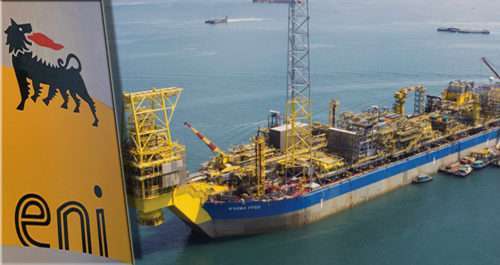Italian oil major, Eni, has said its existing gas sale agreement with the Government of Ghana (GoG) is helping the state save some $1bn annually.
In addition to the aforementioned savings being made, all gas produced from the Sankofa oil field are fully utilised by government with no excess gas accrued given the fact that government’s demand for gas often exceeds the agreed contractual volumes.
According to the oil firm, the Sankofa oil field however, has an additional gas supply capacity (from 210 to 260mmscfd) available to the government, should the government decide to increase its offtake from the oil field.
The above assertion by Eni, is in response to an article titled “Ghana’s uncontrolled focus on LNG imports risks investment attraction in gas sector – ACEP” and published by norvanreports.
In the said article, a Civil Society Organisation (CSO) known as the CSO Budget Forum, demanded of government that it abandon plans to import Liquified Natural Gas (LNG) for power generation in the country.
According to the CSO Budget Forum, its call for government to halt importation plans of LNG, is informed by the availability of unutilised excess gas supply from the country’s three oil and gas producing fields – Sankofa, TEN and Jubilee.
The Group notes that, government is not making optimum use of its gas reserves given that most of the gas produced from the oil fields are either flared or re-injected.
It asserts that, in 2020 alone, over 64 percent of total gas produced from the three oil fields was not utilised. In the case of the Sankofa field where gas produced from the field is on take-or-pay basis, about 20 percent of the total gas produced were unutilised resulting in the continuous payment for unutilised gas.
However, Eni disagrees with the position of the Group, stating that, “Eni fully shares the view of maximising the use of domestic gas, being very competitive at present (and not only) market conditions environment, with respect to any imported LNG. The existing gas sale agreement is assuring the Government of Ghana with a stable and very competitive gas supply, that at the current level of prices is granting potential saving in the tune of 1 b$ per year when compared to LNG or liquids as alternative fuel for power generation.
“Regarding the use of Sankofa gas, it should be noted that in 2021 the Sankofa gas has been fully utilized: GoG gas demand has exceeded the contractual volumes and therefore no unitilized gas has accrued. In 2022 the trend of increased offtake is continuing, due to additional demand.
“It should also be considered that any unutilized gas accrued from take or pay in the past can be subsequently taken for free by the GoG, based on the terms of the existing agreement (“make up gas”). This option has been used in 2021, and will be utilized in 2022 and the following years according to the present trend in demand. Furthermore, Sankofa has an additional capacity that is available in case GoG would like to increase offtake (from 210 to 260 mmscfd).”
Government, through the Tema LNG terminal – when fully operational – is anticipated import LNG for power generation so as to be able to meet the industry’s demand for electricity which have mostly relied on heavy fuel oils and diesel imports.
Ghana has one of Africa’s highest rates of electrification, yet industrial development has been hampered by unreliable supply. Over-reliance on hydro-power led to a prolonged crisis in power supply, which included electricity rationing, between 2012 and 2015.
According to the African Develoment Bank (ADB) which is a financier of the Tema LNG project, current natural gas demand in the country is not being reliably met by local gas production or serviced by the West African Gas Pipeline, hence the Tema project will facilitate electricity grid expansion.
With the arrival of a floating regasification unit (FRU) for the terminal, the terminal has the capacity to receive, re-gasify, store, and deliver around 1.7 million tonnes of LNG a year, about 30 per cent of Ghana’s general capacity.

